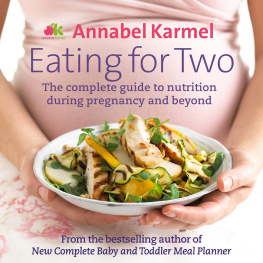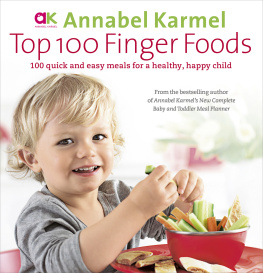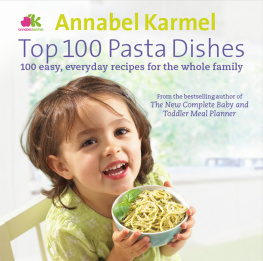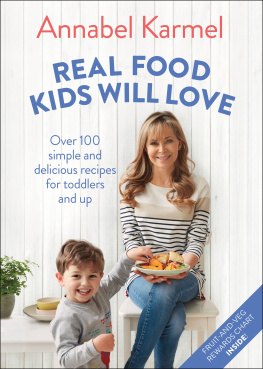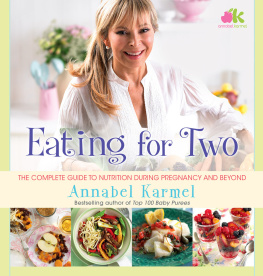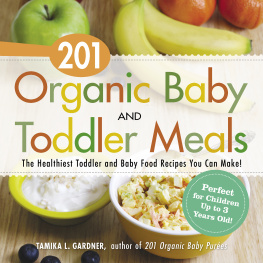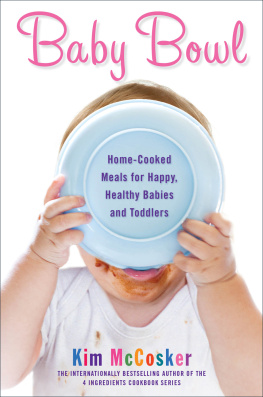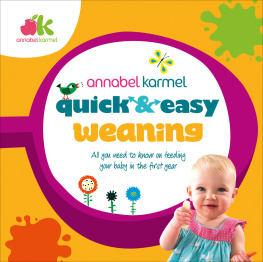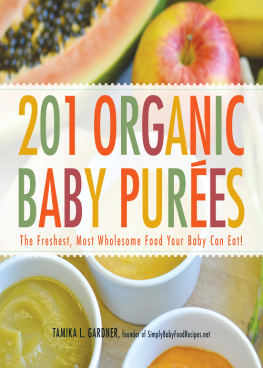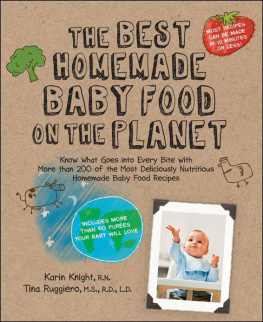

Contents

This ebook is copyright material and must not be copied, reproduced, transferred, distributed, leased, licensed or publicly performed or used in any way except as specifically permitted in writing by the publishers, as allowed under the terms and conditions under which it was purchased or as strictly permitted by applicable copyright law. Any unauthorized distribution or use of this text may be a direct infringement of the authors and publishers rights and those responsible may be liable in law accordingly.
Epub ISBN: 9781446408995
Version 1.0
1 3 5 7 9 10 8 6 4 2
Ebury Press, an imprint of Ebury Publishing,
20 Vauxhall Bridge Road,
London SW1V 2SA
Ebury Press is part of the Penguin Random House group of companies whose addresses can be found at global.penguinrandomhouse.com

Text Annabel Karmel 2005
Photographs Dave King 2005
Cover Design: Smith & Gilmour, London
Annabel Karmel has asserted her right to be identified as the author of this work under the Copyright, Designs and Patents Act 1988
First published in Great Britain in 2005
www.eburypublishing.co.uk
A CIP catalogue record for this book is available from the British Library
Editor: Kate Parker
Design and art direction: Smith & Gilmour, London
Photographer: Dave King
Food stylist: Dagmar Vesely
Props stylist: Jo Harris
ISBN 9780091904999
Contents
Introduction
Starting solids
Babies grow more rapidly in their first year than at any other time in their life, so how you feed your newborn will be one of the most important decisions you make for your new baby.
Dont be in a hurry to wean your baby on to solids. For the first six months or so, breast milk or formula provides all the nutrients your baby needs, and should remain the main source of nourishment. Indeed, guidelines issued by the UK Department of Health recommend breastfeeding exclusively for this period.
At around six months, however, your baby will reach a stage where she needs solid foods as well as milk in her diet. For example, the store of iron that she will have been born with will have been used up and so it will be important to include iron-rich foods in her diet (see ).
There is no right age at which to introduce solids, though, as every baby is different. However, solids should not be introduced before seventeen weeks after your child is born. A young babys digestive system is not sufficiently developed before this time and there is a greater risk of allergy developing. If you feel that your baby needs solids earlier than at six months, speak to your health visitor or GP.
Signs that your baby is ready:
- still hungry after a full milk feed
- demands feeds more frequently
- wakes at night for a feed having previously slept through
Your babys nutritional needs
The nutritional needs of babies and toddlers are different from those of an adult a low-fat, high-fibre diet is good for a full-grown person but not appropriate for babies or young children as they need more fat and concentrated sources of calories and nutrients to fuel their rapid growth. With this in mind, it is best not to give low-fat dairy products, such as milk and yoghurt, to young children, but choose instead the full-fat variety.
Neither should they be given too much fibre, as it tends to be bulky and can fill them up before they take in all the nutrients they need for proper growth and development. In addition, excess fibre can also flush out valuable minerals and cause other problems such as diarrhoea. Consequently, fibrous foods like dried fruits and pulses should be given in moderation, as should wholemeal bread and wholegrain cereals like Weetabix. Likewise, fruit pures, such as apple, pear and plum, shouldnt be given too frequently.
Babies should eat a wide variety of fruit and vegetables, however, to ensure they have plenty of vitamins and minerals in their diet. After the first few weeks of weaning, make sure that, as well as fruit and vegetable pures, you give foods that are relatively high in calories, such as mashed avocado, fruit mixed with Greek yoghurt or Vegetables with Cheese Sauce (see ).
Iron is very important for your babys mental and physical development. A baby is born with a store of iron that lasts for about six months. After this it is important that your baby gets the iron she needs from her diet. Iron in foods of animal origin, like red meat or poultry, is much better absorbed than iron in foods of plant origin, like green vegetables or cereal. Vitamin C helps boost iron absorption, so give your baby vitamin C-rich fruits like berry or citrus fruits (but not before six months see ), or vegetables like broccoli or sweet pepper.
Vitamin supplements
For most babies vitamin supplements are probably unnecessary, so long as they are eating fresh food in sufficient quantity and drinking formula milk until the age of one. However, the Department of Health recommends that if your baby is being breastfed (breast milk doesnt contain enough vitamin D) or is drinking less than 500ml (18fl oz) of infant formula a day, you should give your baby vitamin supplements from six months to two years of age. Ask your health visitor for advice.
The benefits of homemade baby food
The ingredients of most commercial baby foods have been heated to a very high temperature and then cooled, in order to sterilise them. This gives them a very long shelf life (usually two years) but destroys a lot of the flavour and some of the nutrients in the process. There is nothing better for your baby than making your own fresh baby food, and it is cheaper than buying the commercial variety. You will know exactly what the ingredients are, you can introduce a wide range of foods and your baby will get used to eating like the rest of the family so the transition to family meals will be easier. Preparing larger quantities than you need and freezing small portions in ice-cube trays or small pots can save you time and effort.
The importance of milk in a babys diet
As stated above, breast or formula milk should provide all the nutrients your baby needs in the first six months. Ideally, you should try to breastfeed your baby until he is at least six months (twenty-six weeks) old. Indeed, its best not to give your baby anything apart from breast milk during that period. Even after your baby starts eating other foods, it is still really important to make sure he gets enough milk. Between six months and one year, babies should still be receiving a minimum of 500600ml (1820fl oz) of breast or formula milk a day.
Breast milk is always preferable to formula because, in addition to meeting all of your babys nutritional requirements, it contains antibodies that will help your baby fight illness and infection. In addition, breastfeeding for six months has been shown to delay the onset and reduce the severity of allergies in children from families with a history of asthma, hay fever, eczema and food allergy.
Next page

